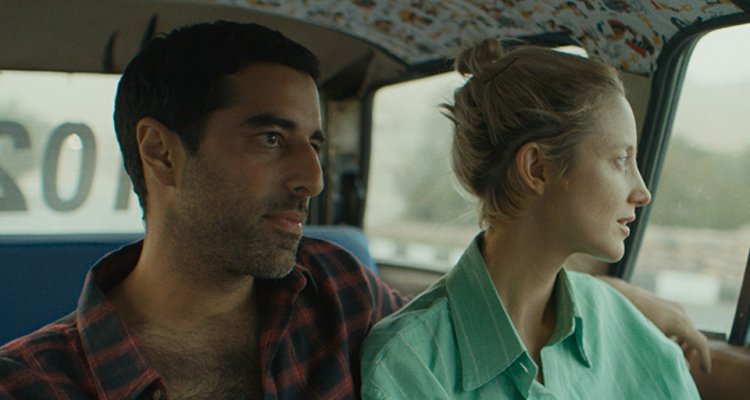It can be difficult to sew old wounds closed when surrounded by relics of the past, especially in a time when human decency appears to be crumbling, as we wake up to more news stories of monstrous terror with every sunrise. Zeina Durra’s meditative PTSD romance, “Luxor,” moves at the deliberate, leisurely pace of a deep breathing exercise meant to alleviate stress.
READ MORE: Here Are Our Most Anticipated Films from the 2020 Sundance Film Festival
“Luxor” feels at home between films such as Kogonada’s discourse poem “Columbus” and Mia Hansen-Løve’s underseen “Maya,” featuring stretches of quiet contemplation and conversations of intimate reflection. Like Kogonada’s debut, the milieu wraps the motif of memory into structural accomplishments; instead of two new friends discussing mutual parental frustrations around The First Christian Church, a fractured couple talks superstition and certainty below the sands of Ramses ancient kingdom.
READ MORE: The 100 Best Films Of The Decade [2010s]
Hana (Andrea Riseborough) is in serious need of a much-deserved respite from a world divided by conflict. After spending an extended period of time tending to wounded war victims on the Jordanian-Syrian border, she decides to take a trip down memory lane, returning to the luscious oasis of Luxor, Egypt, where she spent much of her 20s, desperate to remove herself from the recent events which left quite a scar. As Hana aimlessly wanders around temple ruins where senior citizens come for spiritual tour guides like a walking mummy, casually strolling into action when an elderly woman collapses from the heat, it’s clear that the doctor’s experiences left her more than a little shell-shocked.
Hana can no longer separate the little things in life, although she’s good at laughing them off and deprecating herself. Laying in an air-conditioned room in a sparkling clean bathroom, the physician’s almost lifeless body appears frozen, as if she’s a patron saint of healing who has cast a curse of self-imposed exile. When an unabashedly forward, incredibly basic character comes onto her at the hotel bar one night, Hana ends up tip-toeing out of his room the next morning, avoiding the man and his privileged, rich white dude vacation problems for the remainder of her stay.
READ MORE: The 100 Most Anticipated Films Of 2020
Hana is finally able to find some peace and solace in keeping Sultan’s (Karim Saleh) company, an old archeologist friend whom she bumps into on a ferry boat ride across the Nile, but she’s also increasingly trepidatious to rekindle with him, unwilling to give herself over emotionally, to fully revive the connection that they once had. She fears that being drawn back into the catacombs of their old, long-distance relationship may not be so different from clinging onto a nostalgia-tinged hieroglyphic. Being attracted to a person whose existence entails living in the past no longer seems as soothing as it once was, now serving as an additional reminder of the pain Hana’s left behind, who’s been shaken enough to always be a little unsure of what lays ahead of her.
“Luxor” is a fairly reserved film with simple but firm intentions. It isn’t particularly interested in using fancy film techniques to draw viewers in, but rather, create an atmosphere that encapsulates the double-edged sword of isolated loneliness ability to move an individual closer to enlightenment. To alleviate the downer state, Durra playfully implements a clever chapter card device, almost as if she’s chopping the narrative up into thematic interludes, referencing cultural icons and marking location settings that enhance the motifs. One reads: “The Grateful Dead: Hotel Garden,” and another “Bob Marley’s Boat: Housekeeping.” What do Sigmund Freud and Egyptology have in common besides the inevitable fear of loss? More than it seems on the surface.
READ MORE: 52 Films Directed By Women To Watch In 2020
The visible insecurity and tender imperfection of Riseborough’s performance are powerfully effective, with one palpable scene finds her softly stretching her hand to the empty side of the bed. Towards the climax, in a more expressly dramatic sequence, Durra shoots her spinning on the floor of a public space in a single take, Hana almost coiling into a fetal position, before doing a hermit crab walk (again, drinking isn’t her friend at the moment). Saleh’s work compliments Riseborough’s reticence with a degree of compassion that doesn’t oversell the sentimental side of the material.
Durra’s film does have an artistic ceiling, being so focused and specific in its aesthetic, walking over some well-worn art house emblems, featuring shades of “Certified Copy,” or the ‘Before‘ trilogy, a mock phone call scene perhaps being a purposeful homage to Richard Linklater’s seminal romance. But if that kind of movie is your bag, you’ll find a lot to love about “Luxor,” a picture not so dissimilar from the symbol of an ankh, as afflictions are excavated, a ray of divine sunlight shines through, and what once felt like an eternal absence is illuminated as a tunnel that can be crawled out of with the aid of a deeply personal connection. [B]
Follow along for all of our coverage from the 2020 Sundance Film Festival here.

